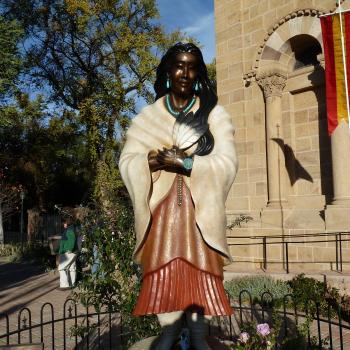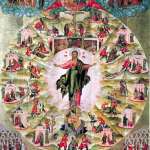It’s a mortal sin was all I was told
For as long as I can remember, I had struggled with masturbation. I’ve written a lot about my journey through this, addiction to it, and deliverance and healing from it. But one moment keeps standing out to me, one moment keeps popping back up in my life. It was the moment I learned that masturbation is (or, more accurately, can be) a mortal sin. I knew that masturbation isn’t good and I knew I shouldn’t do it, but that first time I heard that it can be a mortal sin really shook me. I had just opened up to my best friend about it and discovered that she struggled with it, too. We had been a sort of weird support for each other in this because we really didn’t understand it. Then she went on her confirmation retreat with her parish and called me when she came back from the weekend. “They said it’s a mortal sin,” she said. There was no other explanation given, no methodology to stop or get help, just, “Don’t do this, it’s a mortal sin.”
I was 16 at the time and mired in addiction to masturbation (thought I didn’t know it at the time). Now I also had the fear of hell heaped upon me.
Walk with me as Christ walked with His disciples
No one walked with me through my addiction in those early days. No one helped me look through the three requirements for a sin to be mortal and help me parse out if I was actually committing mortal sin. I was masturbating, so I was mortally sinning. But I couldn’t stop. I didn’t know how to. I didn’t want to be masturbating but I also didn’t have the tools to make myself stop. I prayed every day. I was involved with my youth group. I was involved with my diocese. I was considering becoming a religious sister! I loved (and still do, in case you’re wondering) Jesus and wanted to follow Him and be united with Him. But there was this large stumbling block in the way that I had no clue how to remove. And during this, I started developing a hatred of myself. I didn’t love myself and, since I couldn’t stop sinning in what I was led to believe was a mortal way, I didn’t believe that I was lovable. Jesus was wasting His time on me.
The story of the woman caught in adultery (cf. John 8:1-11) always filled me with a glorious hope. She was caught literally in the act of adultery, witnesses dragged her to the temple where Jesus was, and they asked for the punishment proscribed by Mosaic Law. The elders and everyone else who dragged that woman before Jesus were not necessarily being unmerciful or cruel; they were following their laws and tradition. But Jesus came to fulfill the Old Covenant and begin a new one. The old way wasn’t good enough anymore and so Jesus modeled a new one. “Let the one among you who is without sin cast the first stone.”
This is the new covenant– none of us are without sin and we need a savior. The savior we get is Jesus Who does not condemn us but forgives us and fills us with hope and the grace to sin no more. What we see in this story is basically the first confession. The woman’s sins are brought before the Lord and He says, “Neither do I condemn you. Go and sin no more.” This mirrors the words of absolution: “I absolve you in the name of the Father, and of the Son, and of the Holy Spirit. Go in peace.”
Healing came when I forgave myself
I didn’t stop going to mass or confession or praying or being involved and trying desperately to be worthy of the Love of God. I never stopped believing in Him. But I couldn’t believe that I was good or worthy of any of what He had for me. And this was an even bigger stumbling block than the sin itself. I let God forgive me time and again, but I couldn’t forgive myself even once. In this way, a new sin entered my life: pride. By denying myself the forgiveness Christ gave me, I was essentially setting myself up as higher than God. I was saying to Him, “I know you knit me in my mother’s womb and have known every fiber of my being, but I still know me better than You do.”
One night I had been praying with my spiritual director and she told me to ask God’s forgiveness for my sins. I did. Then she told me to forgive myself. I couldn’t even say the word, “Theresa, I forgive you,” let alone believe them! I knelt in front of a crucifix for what felt like hours trying to see myself as God sees me, to love myself as God loves me. I knew I screwed up, I knew I constantly fell short, I knew that I wasn’t worthy. As I gazed upon Christ’s arms outstretched on the cross, it just finally clicked for me that of course I’m not worthy! That’s why He died for me. And by not forgiving myself, I was denying His act of salvation in my life. So I again looked at that crucifix and said, “Theresa, I forgive you for being weak.” And a flood poured forth from me and I could actually feel myself being healed.
What’s so mortal about that?
It seems that we sometimes have difficulty distinguishing between mortal and venial sins and often lay the burden of mortal sin upon others without proper understanding. That’s what happened to me when I was 16. But for a sin to be truly mortal, three conditions must be met all at once:
“Grave matter is specified by the Ten Commandments, corresponding to the answer of Jesus to the rich young man: ‘Do not kill, Do not commit adultery, Do not steal, Do not bear false witness, Do not defraud, Honor your father and your mother.’ The gravity of sins is more or less great: murder is graver than theft. One must also take into account who is wronged: violence against parents is in itself graver than violence against a stranger.
Mortal sin requires full knowledge and complete consent. It presupposes knowledge of the sinful character of the act, of its opposition to God’s law. It also implies a consent sufficiently deliberate to be a personal choice. Feigned ignorance and hardness of heartThis do not diminish, but rather increase, the voluntary character of a sin.
Unintentional ignorance can diminish or even remove the imputability of a grave offense. But no one is deemed to be ignorant of the principles of the moral law, which are written in the conscience of every man. The promptings of feelings and passions can also diminish the voluntary and free character of the offense, as can external pressures or pathological disorders. Sin committed through malice, by deliberate choice of evil, is the gravest.
Mortal sin is a radical possibility of human freedom, as is love itself. It results in the loss of charity and the privation of sanctifying grace, that is, of the state of grace. If it is not redeemed by repentance and God’s forgiveness, it causes exclusion from Christ’s kingdom and the eternal death of hell, for our freedom has the power to make choices for ever, with no turning back. However, although we can judge that an act is in itself a grave offense, we must entrust judgment of persons to the justice and mercy of God” (Catechism of the Catholic Church 1858-1861).
This would’ve been so helpful to me if I had understood it early on or if I had people walking with me who could teach me this rightly. As it turns out, when I was 16, I hadn’t been committing mortal sin after all, and I didn’t commit one up until I found healing from the addiction. It’s actually quite hard to commit a mortal sin with all three requirements fully present. This should not lead us to laziness, but rather that hope and mercy should spur us on to be even better; we must make a response of faith.
It’s called the Good New for a reason
It is very good to catechize others and make them aware of the Faith, even when that means making them aware of their shortcomings. It is a work of mercy! But we must be very careful to present the Gospel as what it is: Good News. Not condemnation, not despair, but hope and love and joy.
It is not enough to tell someone what they do is wrong or to tell ourselves that, either. We must also walk with each other to find that grace and mercy and learn how to respond to it properly. We need each other and God most when we are going through the dark valleys of life. “Even though I walk through the valley of the shadow of death, I will fear no evil, for you are with me; your rod and your staff comfort me” (Psalm 23: 4).
Christ came to raise us all up to Him. He loves us and He wants us and we must remember that. As the Contemplatio calls us to make a generous response of love to God’s great gift of Himself, we should try to do that day after day after day until kingdom come.
Image courtesy of https://en.wikipedia.org/wiki/Sunrise

















